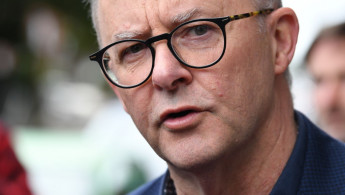What does Anthony Albanese’s victory mean for future Australia-Palestine relations?
Anthony Albanese was elected prime minister of Australia last weekend as voters booted incumbent Scott Morrison and his conservative government out of office.
Albanese’s victory marked the first time in almost a decade that a Labor government is in power in Australia, and sent shockwaves around the world.
"Tonight, the Australian people have voted for change," The newly elected leader told roaring crowds on election night.
Thank you Australia. pic.twitter.com/58ZHJCRIlO
— Anthony Albanese (@AlboMP) May 21, 2022
Who is Albanese and how did he win the election?
Anthony Albanese is a student activist turned 'centrist statesman' who has led the Australian Labor Party for nine years in opposition.
The 51-year-old grew up in a Sydney suburb with his mother, a disability pensioner.
"Albo" made a name for himself as an affable character in politics, frequently appearing at pubs and concerts, as well as occasionally DJing at events.
Albanese was previously seen as a progressive voice, but political commentators noted that he shifted to the centre of the political spectrum to appeal to a broader range of voters.
During his 26-year political career, Albanese held senior roles in Labor’s former government under Kevin Rudd. While in opposition, he became a vanguard for the left during Morrison’s tumultuous premiership characterised by creeping populism and climate change denial.
His win on 11 May has largely been viewed as a loss for Morrison rather than a victory for Labor, who are on course to form a majority government - but only just.
Independent candidates such as "the teals" - who ran on a pro-environment and anti-corruption platform - claimed sweeping victories in once safe conservative seats. Australia’s Greens also recorded one of their best ever election results.
What does Albanese’s win mean for Australia's approach to Palestinian sovereignty?
In earlier parts of his career, Albanese spoke out against Israeli aggression. In 2014, he called the bombardment of Gaza by Israel a "collective punishment" that was "completely unacceptable". Four years later, the Labor leader challenged a decision by the Australian government to vote against a UN human rights council motion calling for an investigation into the killings of Palestinian protesters.
However, more recently, Albanese appears to have moved away from a position of Palestinian solidarity.
In an interview with The Australian Jewish News ahead of the election, the Labor leader said any decision it takes on Israel-Palestine will contribute "to a peaceful resolution of the conflict and to progress towards a two-state solution".
When asked about a 2018 resolution to recognise a state of Palestine, Albanese insisted the motion "has no greater or lesser weight" than it did previously.
On the subject of Boycott, Divestment and Sanctions (BDS), a global solidarity campaign to put pressure on the Israeli government, Albanese is a vocal critic.
"When a campaign’s sole purpose is to seek attention, sometimes the smartest thing to do is not to give it the attention it’s asking for," he said.
Albanese led a campaign against Marrickville Council in Sydney when it sought to adopt support for BDS in 2021. "My opposition to BDS is something I’ve been passionate about," he said.
What do Palestinians think of Albanese’s victory?
The Australia Palestine Advocacy Network (APAN), an organisation advocating for Australian policy to support Palestinian human rights, justice and equality, told The New Arab: "With this new government the minimum we expect is what they’ve promised, recognition of Palestine, though we’re yet to see how this will be defined."
The APAN also said they hope to see support for investigations by the International Criminal Court into war crimes in Palestine, and the reinstatement of foreign aid funding.
However, the group’s president Bishop George Browning said: "Labor, as a party has historically not been supportive of Palestine, compare with individual politicians and minor parties, and that’s unlikely to change dramatically."
Join @amnestyOz and APAN this Wednesday evening to learn about Israel's #apartheid, and what we can do in #Australia to help dismantle the system, one step at a time.https://t.co/DmovDOmV0A#EndIsraeliApartheid #FreePalestine #justice #occupation
— APAN (@APAN4Palestine) May 23, 2022
Nevertheless, there are three things that have given APAN cause for optimism.
Firstly, the defeats of "ardent" anti-Palestinian politicians; namely, Morrison. The former Australian leader was considered a close ally to Israel and alongside Donald Trump decided to recognise west Jerusalem as Israel’s capital despite ongoing occupation of Palestinian territories and systematic human rights abuses.
The victories of independent candidates who have been strong supporters of Palestinian self-determination - including a number of new Green and independent parliamentarians - have also raised hopes, as has a groundswell of support for Palestinians among the Australian Labor Party.
ALP members are very supportive of Palestinian self-determination "and internally will be expected greater action," said Browning.
A National YouGov poll in April 2022 found that a majority of the Australian public believe Palestine should be recognised as an independent state and opposed the current approach by the Australian government towards the occupied Palestinian territories.





 Follow the Middle East's top stories in English at The New Arab on Google News
Follow the Middle East's top stories in English at The New Arab on Google News


